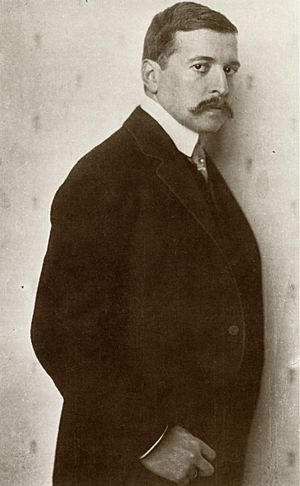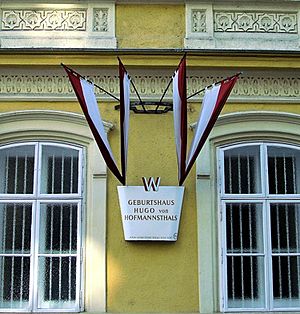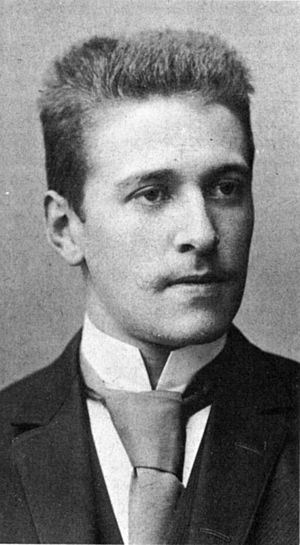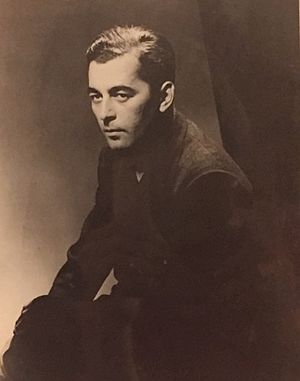Hugo von Hofmannsthal facts for kids
Quick facts for kids
Hugo von Hofmannsthal
|
|
|---|---|

Photograph of von Hofmannsthal, by Nicola Perscheid, 1910
|
|
| Born | 1 February 1874 Landstraße, Vienna, Austria-Hungary |
| Died | 15 July 1929 (aged 55) Rodaun, Liesing, Austria |
| Occupation |
|
| Language | German |
| Citizenship | Austria |
| Education | Akademisches Gymnasium |
| Alma mater | University of Vienna |
| Literary movement | Symbolism |
| Spouse | Gertrud Schlesinger |
| Children | Christiane, Franz, Raimund |
Hugo Laurenz August Hofmann von Hofmannsthal (1874 – 1929) was an important Austrian writer. He wrote many different kinds of works, including novels, poems, plays, and essays. He also wrote libretti, which are the words for operas.
Contents
Early Life and Education
Hugo von Hofmannsthal was born in Vienna, Austria, on February 1, 1874. His mother, Anna Maria Josefa Fohleutner, came from a wealthy Christian Austrian family. His father, Hugo August Peter Hofmann, was a Christian Austrian-Italian bank manager.
His family had a noble title, "Edler von Hofmannsthal," which they inherited from his great-grandfather, Isaak Löw Hofmann. Isaak was a Jewish tobacco farmer who was given this title by the Austrian emperor.
Hugo went to school in Vienna at the Akademisches Gymnasium. There, he studied the works of ancient Roman writers like Ovid, who later influenced his own writing. He started writing poems and plays when he was very young. Because he wasn't allowed to publish his work while still a student, he used fake names like Loris Melikow and Theophil Morren.
When he was seventeen, he met the German poet Stefan George. Some of Hugo's early poems were published in George's magazine, Blätter für die Kunst. After high school, Hugo studied law and then philology (the study of language and literature) at the University of Vienna. However, after graduating in 1901, he decided to become a full-time writer. He was also part of a group of new, experimental writers in Vienna called Young Vienna (Jung–Wien), along with Peter Altenberg and Arthur Schnitzler.
Writing Career
In 1900, Hofmannsthal met the famous composer Richard Strauss. This meeting led to a long and successful partnership. Hugo wrote the words (libretti) for several of Strauss's operas. Some of their most famous collaborations include Elektra (1909), Der Rosenkavalier (1911), Ariadne auf Naxos (1912), and Die Frau ohne Schatten (1919).
In 1911, he adapted an old English play from the 1400s called Everyman into a new version called Jedermann. This play became very popular and is still performed every year at the Salzburg Festival in Austria.
During World War I, Hofmannsthal worked for the government. He wrote speeches and articles that supported Austria's role in the war. After the war ended, the Habsburg monarchy (the ruling family of Austria) lost its power. This was a sad time for Hofmannsthal, who was very patriotic and traditional.
Even so, the years after the war were very busy for him. He continued his writing projects and created more libretti for Richard Strauss's operas. In 1920, Hofmannsthal also helped start the Salzburg Festival, which is now a world-famous music and theater festival. In his later plays, he became more interested in religious themes, especially Catholicism. He even wrote a screenplay (a script for a movie) for a film version of Der Rosenkavalier in 1925.
Hofmannsthal's Ideas
Hugo von Hofmannsthal thought a lot about language and the role of an artist. In 1902, he published a fictional letter called "Ein Brief" ("A Letter"). In this letter, a character named Lord Chandos says he can no longer write because he feels language can't truly describe the world or his thoughts. This idea shows how some writers at the time felt that words weren't always enough to explain complex feelings or ideas.
Hofmannsthal believed that art should do more than just show what humanity is like. He thought artists should create works that inspire people's feelings and actions, rather than just observing them. He also felt that artists should be involved in the world, not just isolated in their art. He thought they should care about politics and society, not just their creative work.
Personal Life
In 1901, Hugo von Hofmannsthal married Gertrud "Gerty" Schlesinger. She was the daughter of a Jewish banker from Vienna. Before they married, Gerty became a Christian. They lived in Rodaun, a town near Vienna, and had three children:
- Christiane von Hofmannsthal (1902–1987)
- Franz von Hofmannsthal
- Raimund von Hofmannsthal (1906–1974)
Hugo von Hofmannsthal passed away on July 15, 1929. He was buried wearing a special robe, as he had requested. His wife, Gerty, later bought a castle called Schloss Prielau in 1932 and died in London in 1959.
Selected Works
Plays
- Der Tor und der Tod (1893)
- Der Tod des Tizian (1892)
- Elektra (1903)
- Ödipus und die Sphinx (1906)
- Die Frau im Fenster (1909)
- Christinas Heimreise (1910)
- Jedermann (1911)
- Der Schwierige (1921)
- Das Salzburger große Welttheater (1922)
- Der Turm (1925)
Libretti
- Elektra (1909)
- Der Rosenkavalier (1911)
- Ariadne auf Naxos (1912, rev. 1916)
- Die Frau ohne Schatten (1919)
- Die ägyptische Helena (1928)
- Arabella (1933)
Narrations and fictitious conversations
- Das Märchen der 672. Nacht (1895)
- Reitergeschichte (1899)
- Erlebnis des Marschalls von Bassompierre (1900)
- Ein Brief (Brief des Lord Chandos an Francis Bacon) (1902)
- Die Wege und die Begegnungen (1907)
- Die Briefe des Zurückgekehrten (1907-1908)
- Das fremde Mädchen (1911)
- Reise im nördlichen Afrika (1925)
Novel (fragment)
- Andreas oder Die Vereinigten (1907-1927)
Essays, speeches, prose
- Zur Physiologie der modernen Liebe (1891)
- Poesie und Leben (1896)
- Über Gedichte (1904)
- Der Dichter und diese Zeit (1907)
- Appell an die oberen Stände (1914)
- Krieg und Kultur (1915)
- Wir Österreicher und Deutschland (1915)
- Österreich im Spiegel seiner Dichtung (1916)
- Preuße und Österreicher (1917)
- Die Idee Europa (1917)
- Buch der Freunde, Aphorismen (1922)
- Früheste Prosastücke (1926)
- Wert und Ehre deutscher Sprache (1927)
- Das Schrifttum als geistiger Raum der Nation (1927)
Poetry
- Siehst du die Stadt? (1890)
- Spaziergang (1893)
- Ballade des äusseren Lebens (1894)
- Gedichte in Terzinen (1894)
- Traum von großer Magie (1896)
- Gedichte (1922)
See also
 In Spanish: Hugo von Hofmannsthal para niños
In Spanish: Hugo von Hofmannsthal para niños
 | Selma Burke |
 | Pauline Powell Burns |
 | Frederick J. Brown |
 | Robert Blackburn |




